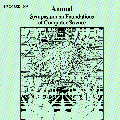Recent remarkable advances in learning theory have established that, for total concept classes, list replicability, global stability, differentially private (DP) learnability, and shared-randomness replicability all coincide with the finiteness of Littlestone dimension. Does this equivalence extend to partial concept classes? We answer this question by proving that the list replicability number of $d$-dimensional $\gamma$-margin half-spaces satisfies \[ \frac{d}{2}+1 \le \mathrm{LR}(H^d_\gamma) \le d, \] which grows with dimension. Consequently, for partial classes, list replicability and global stability do not necessarily follow from bounded Littlestone dimension, pure DP-learnability, or shared-randomness replicability. Applying our main theorem, we resolve several open problems: $\bullet$ Every disambiguation of infinite-dimensional large-margin half-spaces to a total concept class has unbounded Littlestone dimension, answering an open question of Alon, Hanneke, Holzman, and Moran (FOCS '21). $\bullet$ The maximum list-replicability number of any finite set of points and homogeneous half-spaces in $d$-dimensional Euclidean space is $d$, resolving a problem of Chase, Moran, and Yehudayoff (FOCS '23). $\bullet$ Every disambiguation of the Gap Hamming Distance problem in the large gap regime has unbounded public-coin randomized communication complexity. This answers an open question of Fang, G\"o\"os, Harms, and Hatami (STOC '25). Our lower bound follows from a topological argument based on the local Borsuk-Ulam theorem of Chase, Chornomaz, Moran, and Yehudayoff (STOC '24). For the upper bound, we construct a list-replicable learning rule using the generalization properties of SVMs.
翻译:暂无翻译



